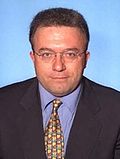 |
|---|
|
This is the list of presidents of Lazio since 1970.
- Presidents elected by the Regional Council (1970–1995)
| N. | Name | Term of office | Political party | Legislature | |
|---|---|---|---|---|---|
| 1 | Girolamo Mechelli | 1 September 1970 | 17 January 1972 | Christian Democracy | I (1970) |
| 2 | Luigi Cipriani | 17 January 1972 | 23 October 1973 | Christian Democracy | |
| 3 | Rinaldo Santini | 23 October 1973 | 22 September 1975 | Christian Democracy | |
| 4 | Roberto Palleschi | 22 September 1975 | 23 March 1976 | Italian Socialist Party | II (1975) |
| 5 | Maurizio Ferrara | 23 March 1976 | 5 August 1977 | Italian Communist Party | |
| 6 | Giulio Santarelli | 5 August 1977 | 8 August 1980 | Italian Socialist Party | |
| 8 August 1980 | 24 March 1983 | III (1980) | |||
| 7 | Bruno Landi | 24 March 1983 | 18 April 1984 | Italian Socialist Party | |
| 8 | Gabriele Panizzi | 18 April 1984 | 31 July 1985 | Italian Socialist Party | |
| 9 | Sebastiano Montali | 31 July 1985 | 17 May 1987 | Italian Socialist Party | IV (1985) |
| (7) | Bruno Landi | 17 May 1987 | 27 July 1990 | Italian Socialist Party | |
| 10 | Rodolfo Gigli | 27 July 1990 | 5 August 1992 | Christian Democracy | V (1990) |
| 11 | Giorgio Pasetto | 5 August 1992 | 21 February 1994 | Christian Democracy | |
| 12 | Carlo Proietti | 21 February 1994 | 18 January 1995 | Italian Socialist Party | |
| 13 | Arturo Osio | 18 January 1995 | 19 May 1995 | Federation of the Greens | |
- Directly-elected presidents (since 1995)
| N. | Portrait | President | Term of office | Tenure (Years and days) | Party | Composition | Legislature | ||
|---|---|---|---|---|---|---|---|---|---|
| 14 |  | Piero Badaloni (1946– ) | 19 May 1995 | 12 May 2000 | 4 years, 359 days | Independent / The Democrats | The Olive Tree PDS–PRC–PPI–FdV–PRI | VI (1995) | |
| 15 |  | Francesco Storace (1959– ) | 12 May 2000 | 2 May 2005 | 4 years, 355 days | National Alliance | House of Freedoms AN–FI–CCD–CDU | VII (2000) | |
| 16 |  | Piero Marrazzo (1958– ) | 2 May 2005 | 27 October 2009 [a] | 4 years, 178 days | Independent / Democratic Party | The Union Ulivo/PD–PRC–FdV–PdCI–UDEUR–IdV | VIII (2005) | |
| 17 |  | Renata Polverini (1962– ) | 16 April 2010 | 12 March 2013 [b] | 2 years, 330 days | The People of Freedom | LP–PdL–UdC–LD | IX (2010) | |
| 18 |  | Nicola Zingaretti (1965– ) | 12 March 2013 | 19 March 2018 | 9 years, 243 days | Democratic Party | Italy. Common Good PD–SEL–PSI–CD | X (2013) | |
| 19 March 2018 | 10 November 2022 [c] | PD–LeU–+Eu–CS–M5S [d] | XI (2018) | ||||||
| 19 |  | Francesco Rocca (1965– ) | 2 March 2023 | Incumbent | 2 years, 182 days | Independent (close to FdI) | FdI–League–FI–UdC | XII (2023) | |
- ↑ Resigned after a sex scandal. His deputy Esterino Montino (PD) held the office till a new regional election was called.
- ↑ Resigned on 27 September 2012 after a corruption scandal. She remained in office as acting President till a new regional election was called.
- ↑ Resigned after being elected to the Chamber of Deputies. His deputy Daniele Leodori (PD) held the office till the following regional election.
- ↑ Since 2021.